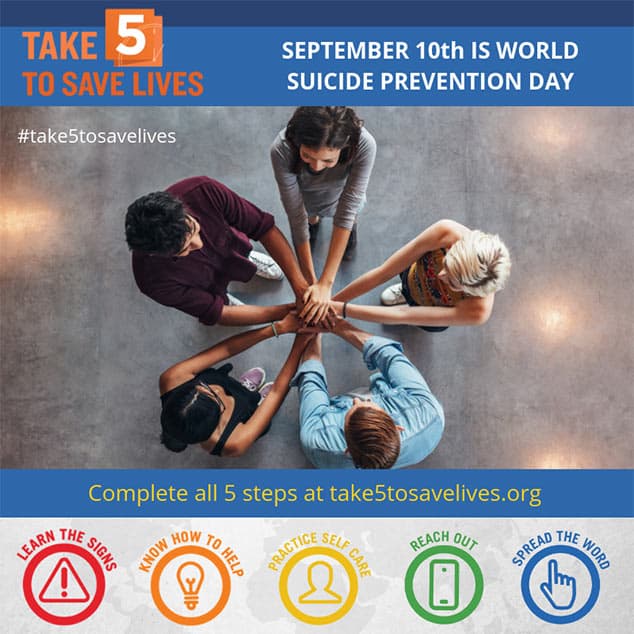It’s Suicide Prevention Awareness Month, a month of awareness about an important issue. While it’s something we should be thinking about year round, September brings renewed focus on this need. As a top 20 cause of death globally, suicide is an issue that needs attention. Every 40 seconds, someone dies by suicide. That’s a lot of people in a day, week, month and year. For every suicide that takes place, 25 more are attemped.
Who is most at risk?
According to Statistics Canada, men are three times more likely to die by suicide than women. In terms of attempts, women are three to four times more likely to attempt suicide. People between the ages of 40-59 have the highest suicide rates. Married people tend to have lower suicide rates. In Canada, suicide is the ninth leading cause of death generally, and second for people ages 15-34.
What can everyday people do to prevent suicide?
You might be thinking, “I’m not a mental health professional, how am I supposed to help prevent suicide?” There are ways that you can actively contribute to mental health safety, like the Take 5 to Save Lives campaign. These are the five steps the campaign encourages:
- Learn the warning signs
- Do your part
- Practise self-care
- Reach out
- Spread the word

How do I talk to a friend or family member about depression and suicide?
If it seems like someone in your life is struggling, it might be intimidating to try and figure out how to bring that up and discuss it without feeling intrusive or embarrassed. HeadsUpGuys has a conversation guide on how to navigate this often difficult topic.
What do mental health professionals suggest?
In this video, David discusses how to approach a conversation in a practical way about suicide, whether bringing it up increases or descreases risk, how to assess risk and what to do if the risk is high:
What should I do if I’m feeling at risk of suicide?
If you’re concerned about your own suicide risk, reach out to a mental health professional immediately or report to an emergency room. It is very important to take this threat to your health and safety seriously. While Wellin5 counsellors can support your ongoing health and wellness, in the event of a mental health emergency it is crucial to be seen as soon as possible.
Suicide prevention isn’t just something mental health professionals do, we can all play a part. Knowing the signs, having the tough conversations, and reaching out to get help all make a difference. If you’re looking to maintain your mental health, Wellin5 would love to support you to reduce your long term suicide risk, and we encourage you to seek immediate assistance as needed. While September is a month of awareness, this is something to keep in mind always to keep ourselves and each other safe.

